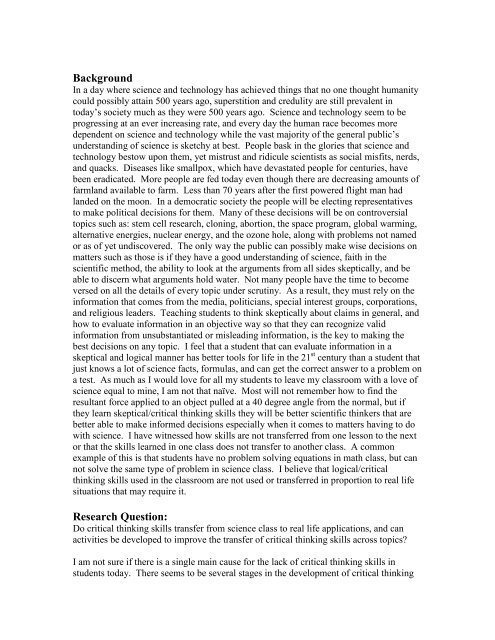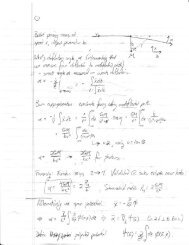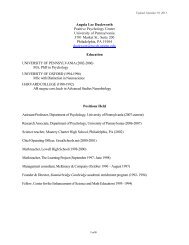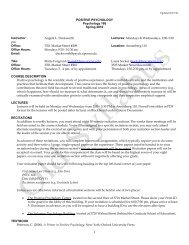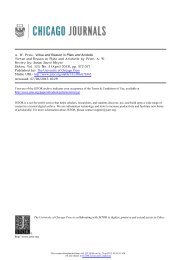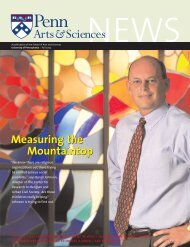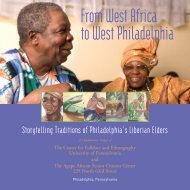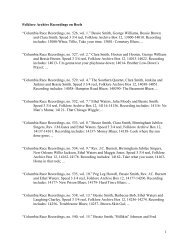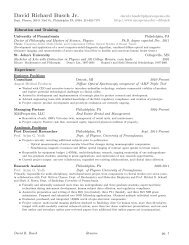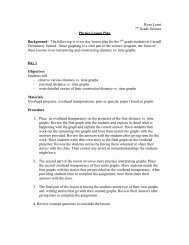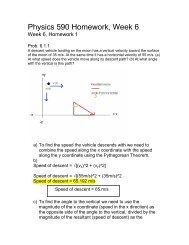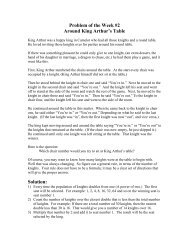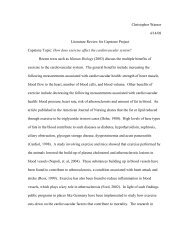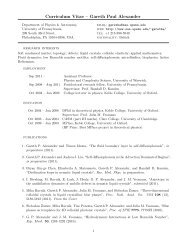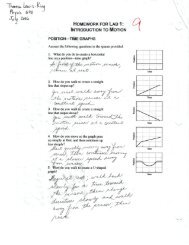Skeptical Thinking in the Classroom and its Impact - School of Arts ...
Skeptical Thinking in the Classroom and its Impact - School of Arts ...
Skeptical Thinking in the Classroom and its Impact - School of Arts ...
Create successful ePaper yourself
Turn your PDF publications into a flip-book with our unique Google optimized e-Paper software.
Background<br />
In a day where science <strong>and</strong> technology has achieved th<strong>in</strong>gs that no one thought humanity<br />
could possibly atta<strong>in</strong> 500 years ago, superstition <strong>and</strong> credulity are still prevalent <strong>in</strong><br />
today’s society much as <strong>the</strong>y were 500 years ago. Science <strong>and</strong> technology seem to be<br />
progress<strong>in</strong>g at an ever <strong>in</strong>creas<strong>in</strong>g rate, <strong>and</strong> every day <strong>the</strong> human race becomes more<br />
dependent on science <strong>and</strong> technology while <strong>the</strong> vast majority <strong>of</strong> <strong>the</strong> general public’s<br />
underst<strong>and</strong><strong>in</strong>g <strong>of</strong> science is sketchy at best. People bask <strong>in</strong> <strong>the</strong> glories that science <strong>and</strong><br />
technology bestow upon <strong>the</strong>m, yet mistrust <strong>and</strong> ridicule scientists as social misf<strong>its</strong>, nerds,<br />
<strong>and</strong> quacks. Diseases like smallpox, which have devastated people for centuries, have<br />
been eradicated. More people are fed today even though <strong>the</strong>re are decreas<strong>in</strong>g amounts <strong>of</strong><br />
farml<strong>and</strong> available to farm. Less than 70 years after <strong>the</strong> first powered flight man had<br />
l<strong>and</strong>ed on <strong>the</strong> moon. In a democratic society <strong>the</strong> people will be elect<strong>in</strong>g representatives<br />
to make political decisions for <strong>the</strong>m. Many <strong>of</strong> <strong>the</strong>se decisions will be on controversial<br />
topics such as: stem cell research, clon<strong>in</strong>g, abortion, <strong>the</strong> space program, global warm<strong>in</strong>g,<br />
alternative energies, nuclear energy, <strong>and</strong> <strong>the</strong> ozone hole, along with problems not named<br />
or as <strong>of</strong> yet undiscovered. The only way <strong>the</strong> public can possibly make wise decisions on<br />
matters such as those is if <strong>the</strong>y have a good underst<strong>and</strong><strong>in</strong>g <strong>of</strong> science, faith <strong>in</strong> <strong>the</strong><br />
scientific method, <strong>the</strong> ability to look at <strong>the</strong> arguments from all sides skeptically, <strong>and</strong> be<br />
able to discern what arguments hold water. Not many people have <strong>the</strong> time to become<br />
versed on all <strong>the</strong> details <strong>of</strong> every topic under scrut<strong>in</strong>y. As a result, <strong>the</strong>y must rely on <strong>the</strong><br />
<strong>in</strong>formation that comes from <strong>the</strong> media, politicians, special <strong>in</strong>terest groups, corporations,<br />
<strong>and</strong> religious leaders. Teach<strong>in</strong>g students to th<strong>in</strong>k skeptically about claims <strong>in</strong> general, <strong>and</strong><br />
how to evaluate <strong>in</strong>formation <strong>in</strong> an objective way so that <strong>the</strong>y can recognize valid<br />
<strong>in</strong>formation from unsubstantiated or mislead<strong>in</strong>g <strong>in</strong>formation, is <strong>the</strong> key to mak<strong>in</strong>g <strong>the</strong><br />
best decisions on any topic. I feel that a student that can evaluate <strong>in</strong>formation <strong>in</strong> a<br />
skeptical <strong>and</strong> logical manner has better tools for life <strong>in</strong> <strong>the</strong> 21 st century than a student that<br />
just knows a lot <strong>of</strong> science facts, formulas, <strong>and</strong> can get <strong>the</strong> correct answer to a problem on<br />
a test. As much as I would love for all my students to leave my classroom with a love <strong>of</strong><br />
science equal to m<strong>in</strong>e, I am not that naïve. Most will not remember how to f<strong>in</strong>d <strong>the</strong><br />
resultant force applied to an object pulled at a 40 degree angle from <strong>the</strong> normal, but if<br />
<strong>the</strong>y learn skeptical/critical th<strong>in</strong>k<strong>in</strong>g skills <strong>the</strong>y will be better scientific th<strong>in</strong>kers that are<br />
better able to make <strong>in</strong>formed decisions especially when it comes to matters hav<strong>in</strong>g to do<br />
with science. I have witnessed how skills are not transferred from one lesson to <strong>the</strong> next<br />
or that <strong>the</strong> skills learned <strong>in</strong> one class does not transfer to ano<strong>the</strong>r class. A common<br />
example <strong>of</strong> this is that students have no problem solv<strong>in</strong>g equations <strong>in</strong> math class, but can<br />
not solve <strong>the</strong> same type <strong>of</strong> problem <strong>in</strong> science class. I believe that logical/critical<br />
th<strong>in</strong>k<strong>in</strong>g skills used <strong>in</strong> <strong>the</strong> classroom are not used or transferred <strong>in</strong> proportion to real life<br />
situations that may require it.<br />
Research Question:<br />
Do critical th<strong>in</strong>k<strong>in</strong>g skills transfer from science class to real life applications, <strong>and</strong> can<br />
activities be developed to improve <strong>the</strong> transfer <strong>of</strong> critical th<strong>in</strong>k<strong>in</strong>g skills across topics?<br />
I am not sure if <strong>the</strong>re is a s<strong>in</strong>gle ma<strong>in</strong> cause for <strong>the</strong> lack <strong>of</strong> critical th<strong>in</strong>k<strong>in</strong>g skills <strong>in</strong><br />
students today. There seems to be several stages <strong>in</strong> <strong>the</strong> development <strong>of</strong> critical th<strong>in</strong>k<strong>in</strong>g


